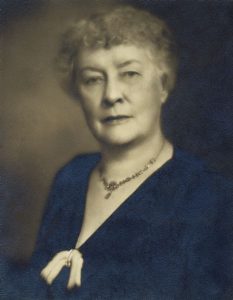This is the third part of a three-part series on Women in Wisconsin Law.
 Not all women who were influential in Wisconsin law were lawyers. Among these influential women was Jessie Jack Hooper, a suffragist and politician who made history by running for one of Wisconsin’s seats in the United States Senate in 1922.
Not all women who were influential in Wisconsin law were lawyers. Among these influential women was Jessie Jack Hooper, a suffragist and politician who made history by running for one of Wisconsin’s seats in the United States Senate in 1922.
Jessie Jack Hooper was born on a farm in Iowa in 1865. In 1888, she married Ben Hooper and moved to Oshkosh, Wisconsin, to begin a new chapter of her life. Mr. Hooper, a graduate from Columbia University Law School, was extremely supportive of his wife’s passion for the women’s suffrage movement. Even before women were given the right to vote, Mr. Hooper went to great lengths to share his right to vote with his wife. One year he would vote as he saw fit, and then the next year, he would vote according to his wife’s wishes.
Once in Oshkosh, Hooper joined a variety of progressive movements in the state, including the Women’s Club and the Wisconsin Federation of Women’s Clubs. Although she was active in a variety of organizations, she was primarily involved in the women’s suffrage movement as a member of the executive board of the National American Woman’s Suffrage Association. During the women’s marches, Hooper returned to her home state of Iowa and delivered the first street speech ever made by a woman. She continued on to Washington, D.C., where she worked closely alongside the leaders who would eventually secure the right to vote. After years of hard work, Hooper helped to secure the passage of the Nineteenth Amendment, which gave women the right to vote.
Following the fight for the federal amendment for woman’s suffrage, Hooper was elected to serve as president for the National League of Women Voters. While serving in this position, Hooper successfully promoted a variety of laws in Wisconsin, including the equal guardianship law, an increase in mother’s pensions, and a law permitting women to serve as jurors. After retiring from her position as president in 1922, Hooper was unanimously selected by the Democratic Party of Wisconsin to run as their candidate for the U.S. Senate. Although she lost the race to Robert La Follette, Hooper made history by securing a remarkable sixteen percent of the vote.
Despite losing the election, Hooper continued to remain very visible in the political sphere by fighting for world peace as a member of the national committee of the League of Women Voters for International Cooperation to Prevent War. She even traveled to the World Disarmament Conference in Geneva, Switzerland, to present a petition seeking the reduction of deadly weapons after World War I. She continued to fight for world peace until she died in 1935 from cancer.
For more information on Jessie Jack Hooper, see the sources below used in writing this post:
Hooper, Jessie Annette Jack, 3 The Biographical Cyclopaedia of American Women 105 (1928).
